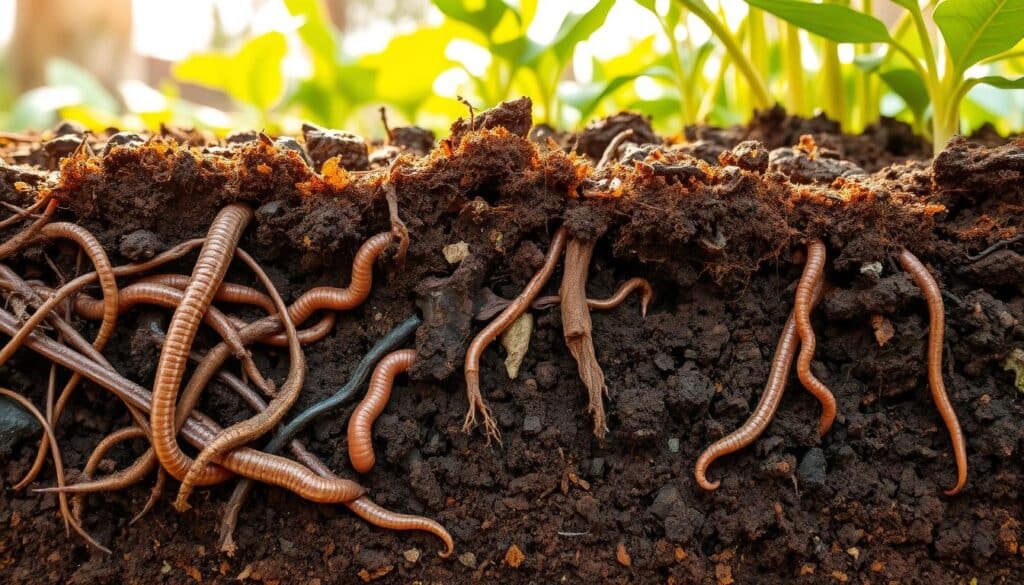Soil health is vital for sustainable gardening. It affects plant vitality and ecosystem resilience. By understanding soil health, gardeners can boost their garden’s growth and their crops’ yield.
Healthy soil feeds plants and reduces environmental harm. This makes organic gardening appealing for those who care about the planet. This guide gives key tips on improving soil health. It helps your garden flourish in tune with nature.
Anúncios
Understanding the Importance of Soil Health
Understanding soil health’s importance begins with recognizing soil’s role in plant growth. Healthy soil boosts plant vitality, crucial for their survival and growth. It provides a stable place for roots and offers necessary nutrients.
The Role of Soil in Plant Growth
Soil delivers vital nutrients and holds water, key for plant growth. Healthy soil lets plants get what they need for photosynthesis and growing. Without rich soil, plant health and crop yields suffer, lowering biodiversity.
Anúncios
Soil as a Living Ecosystem
Soil is a dynamic, living ecosystem, not just an inert material. It’s home to billions of microorganisms, like bacteria, fungi, and nematodes. These tiny creatures are crucial in breaking down organic matter, enriching the soil, and feeding plants.
By understanding this living soil, we can garden more sustainably and boost farming productivity.

Key Components of Healthy Soil
Understanding what makes soil healthy is key for a lush garden. Organic matter improves the soil by boosting its structure and its ability to hold onto nutrients and moisture. This is crucial for making the soil more fertile. Nutrients both big and small, like macronutrients and micronutrients, are vital. They ensure plants get everything they need for growth.
Organic Matter and Its Benefits
Organic matter comes from decayed plants and animals, and it loads the soil with important nutrients. It does more than just boost fertility. It makes the soil’s structure better, which improves air and water flow. This leads to healthier roots and less watering. Organic matter also supports the tiny organisms that help plants get nutrients.
Nutrient Balance: Macronutrients and Micronutrients
For a garden to do its best, it needs both macronutrients and micronutrients. Big nutrients like nitrogen, phosphorus, and potassium support plant growth and are needed in large amounts. Even though plants need micronutrients in smaller amounts, they’re still crucial for health and yields. Having the right balance of nutrients makes plants strong.
How to Improve Soil Structure
Improving soil structure is key for healthy plants and sustainable gardening. Good soil drains water well, supports roots, and absorbs nutrients better. Composting and mulching are great ways to improve soil health.
The Benefits of Composting
Composting is a great way to make soil structure better. It adds organic stuff, helping soil hold water and nutrients. This makes for more air space and active microbes, leading to a stronger ecosystem in gardens.
Using Mulch for Moisture and Nutrient Retention
Mulch brings many benefits to soil health. It helps keep soil temperatures stable, prevents erosion, and keeps moisture in. As it breaks down, it adds organic matter to the soil. Plus, mulch cuts down on weeds, so plants don’t fight over nutrients and water.
Soil Health and Microbial Life
Understanding soil biology shows how important microbes are for soil health. Microbes like good bacteria and fungi help soil structure and nutrient use. They form helpful bonds with plants, improving growth and nutrient uptake.
Importance of Beneficial Bacteria and Fungi
Good bacteria and fungi help keep the soil alive by breaking down dead stuff. This releases nutrients plants need. They help make soil better at holding water and air. They break down organic matter and fight plant diseases.
- Improved soil structure, leading to better water retention and aeration.
- Enhanced nutrient availability through organic matter decomposition.
- Natural disease suppression, which helps protect plants from harmful pathogens.
Creating a Thriving Microbial Community in Your Garden
Here’s how to make your garden full of helpful microbes:
- Avoid too much tilling to save beneficial microbes’ homes.
- Add compost or old manure to feed the soil and keep it diverse.
- Use cover crops to keep the soil ecosystem strong.
By using these strategies, gardeners can build a lively soil world. This supports healthy plants. Knowing about soil microbes can make gardens thrive and lead to better crops.
The Role of Soil pH in Gardening
Understanding soil pH is crucial for keeping plants healthy. The pH level of the soil affects how plants get nutrients. If the soil is too acidic or alkaline, plants may not get what they need, impacting growth and health. To avoid this, gardeners should test their soil regularly.
To balance soil pH, gardeners may add lime to make it less acidic or sulfur to decrease alkalinity. Adjusting the soil pH helps plants absorb more nutrients and promotes healthy root growth. By keeping an eye on soil pH, gardeners can ensure their plants are in the best condition to grow.
Practices for Sustainable Soil Management
Keeping soil healthy for a long time is key for good gardens. Using the right soil techniques makes a big difference. They help with soil structure, available nutrients, and the balance of the whole ecosystem. Organic amendments and rotating crops are two main ways to keep soil in good shape.
Organic Amendments vs. Synthetic Fertilizers
Organic stuff like compost and aged manure makes soil fertile. They boost microbial life and nutrient levels. This keeps the soil ecosystem rich, helping good organisms thrive. On the other hand, chemical fertilizers might give quick nutrition but can ruin soil structure and hurt natural life over the long haul.
Crop Rotation: A Key to Soil Health
Rotating crops is vital for keeping soil alive. It means changing what you plant from one time to the next. This stops soil from getting weak and cuts down on pests. Each kind of plant adds different nutrients to the soil. This keeps the ecosystem balanced and soil health strong.
Cover Cropping and Its Benefits
Cover cropping is key for keeping soil healthy and making gardens more productive. By planting crops that we don’t harvest, gardeners can boost soil fertility. They also fight problems like erosion and losing nutrients. Cover crops are helpful all year round. They offer special benefits in both summer and winter.
Choosing the Right Cover Crops for Your Garden
It’s important to pick the right cover crops to get the most out of them. You should think about your area’s climate, your soil type, and what nutrients your soil needs more of. People often choose:
- Legumes: These plants, like clover and vetch, are great for adding nitrogen back into the soil.
- Cereal grains: Choices like rye and oats cover the soil in winter and make it better.
- Brassicas: Types like mustard can keep pests and diseases away and add organic matter.
Choosing the right cover crops based on your garden’s needs can really help your soil stay healthy. This makes your garden much more productive.
How Cover Crops Improve Soil Fertility
Cover cropping has a big impact on making the soil fertile. Cover crops add to the organic matter in the soil, which makes it richer in nutrients and full of life. When these crops break down, they give nutrients back to the soil. This creates a balanced ecosystem. Using cover crops in summer and winter can:
- Lower the need for chemical fertilizers by recycling nutrients naturally.
- Make the soil’s structure better and keep more water, which is good for growing healthy plants.
- Stop the soil from washing away when the weather’s bad.
In short, cover cropping is essential for gardening in a way that’s good for the environment. It brings lots of benefits that help the soil and the planet.
Water Management and Soil Health
Water management is key to improving soil health. Using smart irrigation, like drip systems, helps water reach plant roots directly. This method cuts down waste. It also lowers the chance of leaf diseases caused by water sitting on leaves.
Using Drip Irrigation for Efficient Water Use
Drip irrigation sends water right to where plants need it, saving water in dry areas. It stops soil from getting too wet, which can harm plants. By using drip irrigation, we make sure water and plant health are balanced.
The Importance of Water Retention in Healthy Soil
For strong plants, soil must hold moisture well. Adding organic matter helps soil keep water. A good soil structure lets air and water move freely, so roots get what they need. Keeping soil healthy means better gardens.
Understanding Soil Testing and Analysis
Soil testing is key for successful gardening. It tells us about soil’s pH, nutrients, and organic matter. This info helps monitor soil health and guides us on what to fix.
It’s important to find out what nutrients are missing. With soil testing, gardeners can see what the soil lacks. They can then pick the right fertilizers to improve plant growth.
Many local agricultural extension offices offer soil testing. They help gardeners understand their soil better. Knowing about your soil helps you take good care of your plants.
Conclusion
Keeping soil healthy is very important for sustainable gardening fans. Understanding the role of soil in growing plants helps gardeners use eco-friendly methods. These methods improve the plant’s health and help the environment too. Adding organic stuff to the soil, smart use of water, and using cover crops make the soil richer.
These good practices help create a garden full of life. By gardening, we help the earth, making our green efforts count for a better tomorrow. When we focus on soil health, we help our plants grow strong and support nature’s balance.
Making soil health a priority is key for a green and fruitful garden. Enriching the soil does more than help our plants. It also takes care of our planet.
FAQ
What is soil health and why is it important?
How can I improve the organic matter in my soil?
Why is microbial life important in soil health?
How does soil pH affect plant growth?
What are some sustainable soil management practices?
What are cover crops, and how do they benefit the soil?
How can I effectively manage water for soil health?
What should I know about soil testing?
Content created with the help of Artificial Intelligence.



